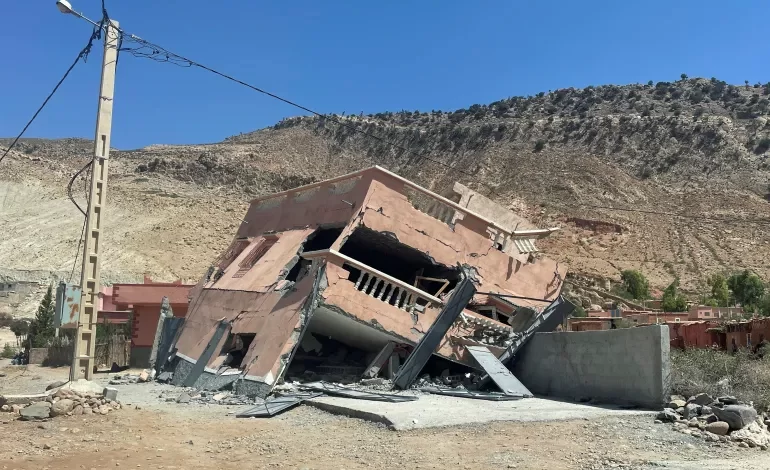The Moroccan Royal Armed Forces overcome challenges for rescue teams in rugged areas
A swift response breaks through the rugged terrains in the disaster-stricken Moroccan regions to secure essential services

Moroccan rescue teams are making tremendous efforts in the areas hit by the earthquake, especially the devastated mountain villages, in an extremely dangerous mission due to the nature of the roads blocked by rocks and mountain landslides.
The tragedy of the earthquake witnessed in Morocco is not only measured by the number of casualties. There are entirely isolated villages, especially in the Al-Houz and Chichaoua regions, where reaching them by land has become almost impossible due to rugged terrains and the closure of some roads due to the falling of large rocks. The earthquake caused massive destruction in several areas of the Adasyl community in the Chichaoua region, located on the border of the Al-Houz region, where houses turned into ruins. The authorities have mobilized all the necessary resources and means to reach these areas, where profound grief prevails.
Moroccan Justice Minister Abdellatif Ouahbi stated that several villages located around the epicenter of the devastating earthquake have completely disappeared. He further mentioned that several old neighborhoods, some of them historical, in the city of Taroudant were significantly damaged.
it pointed out that the authorities are working on accommodating residents who cannot return to their homes in the affected areas and are striving to “overcome road closures around Taroudant. with our priority being to provide basic services.”
Numerous villages in the Al-Houz region, the epicenter of the earthquake, have witnessed extensive destruction. with the village of Tikghat in the Mjat district on the outskirts of Chichaoua becoming uninhabited and lifeless as it turned into rubble due to the significant consequences of the earthquake.
The authorities have been forced to use drones to assist field teams in discovering bodies, in addition to using aircraft for comprehensive surveys of various material losses and to deliver humanitarian aid to the population living in mountainous areas.
In a moving scene, ambulances have been pouring into the Al-Houz area since early morning, while military trucks loaded with logistical equipment are working at their maximum capacity to reopen closed roads due to rockslides in nearly completely destroyed mountainous villages. Not far from there, bodies are being recovered at the top of every hour. and these distressing scenes shake the families residing in the Al-Houz area.
Access to this area requires extreme caution due to the mountain landslides that occurred on the night of the earthquake. which led to road closures for extended hours due to the falling of large rocks from the mountains surrounding the villages on the rugged mountain road. disrupting traffic.
The Royal Moroccan Armed Forces quickly responded to the location after the earthquake occurred, and on Saturday morning. they reopened the closed mountain roads and removed the massive rocks to facilitate the passage of ambulances that transported the injured to hospitals. as well as mortuary transport vehicles that remained stationed in the villages surrounding the Al-Houz area.
Local statements have indicated that the majority of adobe and concrete buildings in several villages have collapsed, leading to a tragic death toll. Efforts by local authorities, with the help of the population, continue to extract the bodies of those who are still under the rubble.
For example, in the village of Mjat, where there are more than fifty traditional houses, most of these buildings collapsed due to the strength of the earthquake, which left dozens of victims whose identities are still unknown, a situation that will increase the death toll in the coming hours, according to the Moroccan “Hespress” website.
Mohammed Assayagh, a seventy-year-old man living in the village, stated that “the earthquake occurred around ten o’clock at night and led to the collapse of most of the buildings in the area.” He continued, saying. “The earthquake was a surprise to everyone. especially since the area has not witnessed such an earthquake for decades.”
added that “many bodies are still under the rubble, and the elements of the Royal Gendarmerie, the Royal Armed Forces, and civil protection are continuing to extract the bodies.” He emphasized that “the electricity and phone network were completely cut off throughout the night.”
that further stated that “families were forced to sleep in the street to avoid collapsing again and remained without food or drink throughout the night.” concluding that “the situation is extremely difficult due to the mountainous terrain. which complicates the process of extracting the bodies of the victims.”
On the other hand, Hussein Ait Bouris, a resident of the region. mentioned that “most of the houses were destroyed in the past hours, necessitating the urgent accommodation of these families who slept on the ground last night. There is also a need to approve financial compensation for families who have lost all their agricultural. livestock, and material possessions.”
the humanitarian catastrophe has caused catastrophic losses for the residents, who suffer from extreme poverty in order to cover the costs of daily life.”
He concluded by stressing the importance of “accommodating families in the initial phase. then searching for economic alternatives in the second phase that follows containing the earthquake.












